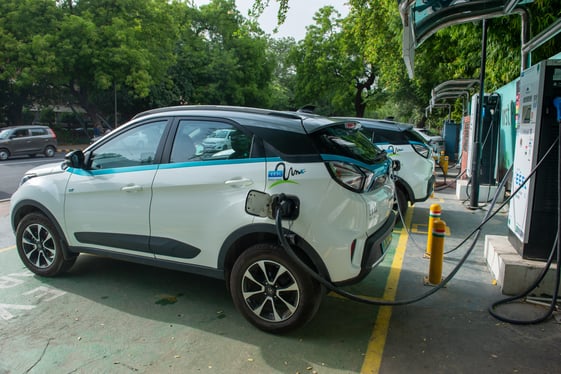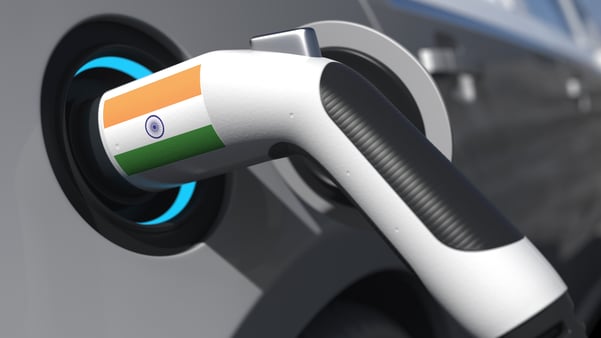Organisations developing e-mobility solutions are used to facing traditional challenges, including developing novel and innovative technology and infrastructure solutions. Successful projects are now also addressing the breadth of global issues such as inequality, injustice, and social inclusion. So, how do we bring these challenges front and centre?
The modernisation and electrification of public transport will always involve the assessment and development of technology, as well as the policies required to implement it – but the Gender Equality and Social Inclusion (GESI) principles are just as vital. ‘GESI considerations’ form a core part of the projects and interventions delivered under UK PACT, helping to reduce inequalities across the world and progress the inclusion of marginalised groups who’ve been historically overlooked.
Our recent blog post – ‘Advancing towards an electric future in Asia’ – showed how UK PACT projects aim to tackle the logistical and technological challenges of electric vehicle uptake. In this blog, we’ll be taking a look at how GESI considerations are implemented and assessed within UK PACT-funded e-mobility projects.
Understanding the GESI considerations within e-mobility
GESI considerations stem from the International Development (Gender Equality) Act of 2014 (ID(GE)A) which required all UK Official Development Assistance (ODA) programmes to make an effort to consciously reduce gender inequality. Additionally, the Sustainable Development Goals (SDGs) established by the UN back in 2015 also echo this sentiment, with SDG 5 focusing on gender equality and SDG 10 covering reduced inequalities.
The SDGs also highlight how e-mobility is intrinsically linked to GESI, with other goals playing back the need for affordable clean energy (SDG 7), sustainable cities and communities (SDG 11) and immediate climate action (SDG 13), all of which aim to improve conditions for the groups that the GESI considerations support.
We’ve previously discussed how gender and inclusion needs to be brought into the mainstream when looking at impactful climate action that needs to be taken. The Intergovernmental Panel on Climate Change (IPCC) has already established how men and women are impacted by climate change differently, as women and girls are disproportionally affected due to pre-existing inequalities. There’s additional research which also shows that the most vulnerable demographics are those who are impacted by climate change the most. It is vital that projects take a holistic view of the various challenges facing different demographics, as well as factoring in local issues, rather than forming generalised solutions which ignore or make other challenges worse.
Therefore, both gender equality and social inclusion need to be given equal weight as other factors within projects aiming to progress e-mobility. Disadvantaged and marginalised groups must not disproportionately suffer when reducing global emissions, and their needs should be actively incorporated within all projects. GESI principles are vital within decarbonisation, as progress within e-mobility cannot be considered truly progressive without them.
A spotlight on GESI considerations in current UK PACT projects
In the five year span between 2021/22 and 2025/26, the UK government has committed to increase the proportion of gender responsive climate finance funding which is able to empower and transform. This commitment includes project funding within Asia, with the three projects below showcasing how UK PACT grantees integrate the GESI considerations. All our projects are required to integrate GESI into their scope with suitable action plans put in place to ensure our projects are gender responsive and inclusive.
Bangladesh – Developing an EV financing tool and business model for EV uptake
 UK PACT is supporting Ricardo PLC via the Green Recovery Challenge Fund, who are running a project for the Government of Bangladesh to develop a financing tool and business model for electric vehicle uptake.
UK PACT is supporting Ricardo PLC via the Green Recovery Challenge Fund, who are running a project for the Government of Bangladesh to develop a financing tool and business model for electric vehicle uptake.
As part of the joint GESI assessment which informed the development of their action plan, female entrepreneurs and female drivers were identified as two major beneficiaries of the project. Specifically, this included support towards providing female drivers with access to safe and secure transport as a key priority for the project.
Equitable access to the activities outlined by the EV business model, as well as the final services it enables, was a further consideration made with GESI in mind. To ensure this was implemented, marginalised ethnic and religious groups across four geographical locations were identified and engaged during development of the business model.
The resulting action plan ensured women and members of marginalised groups will be engaged internally from within Ricardo PLC, as well as externally to capture the views of consumers. This made sure project actions addressed the pertinent GESI considerations, as voiced by the affected groups at every level. While there were challenges to this engagement, consciously looking to engage these groups ensured that they weren’t overlooked by the EV business model for Bangladesh.
Indonesia – Building capacity and action plan to scale up Transjakarta e-buses
As part of Transjakarta’s efforts to transition from their internal combustion engine (ICE) fleet to electric buses, UK PACT is assisting the Institute for Transportation and Development Policy (ITDP) in Indonesia with implementing best practice principles.
This has included running a GESI assessment of this transition project, which identified a large gender disparity within Transjakarta’s workforce. Only 14% of their workforce is female with just a single female field officer, contrasted with a passenger base that’s 77% female, leading ITDP to consider how to appeal to more female applicants when recruiting and further enhancing services for women.
The resulting action plan looked at electrification of two major routes – the “Mikrotrans” and “affordable housing” routes connecting residential areas to Jakarta’s city centre. These routes are favoured by female passengers, those with disabilities, and low-income groups, with future e-bus deployment needing fares to be level with conventional buses to ensure they benefit all people in the city.
Transjakarta will also champion a new women driver campaign with the aim to increase the total share of female drivers, which currently stands at 2% total. This also links into a wider internal drive on equal job opportunities for women and people with disabilities in the factories, following revised policies on gender equality and social inclusion in the workplace.
India – Creating an institutional capacity building framework for electrifying public transport
 India, UK PACT provide funding for Research Triangle Institute (RTI) to identify policy and institutional gaps around transitioning public transport to electric vehicles, both at state and city levels. Overcoming these identified constraints is crucial for facilitating the shift towards sustainable, inclusive growth. By doing so, women and marginalised groups would be able to greatly benefit from the enhancement to services that go beyond just transportation.
India, UK PACT provide funding for Research Triangle Institute (RTI) to identify policy and institutional gaps around transitioning public transport to electric vehicles, both at state and city levels. Overcoming these identified constraints is crucial for facilitating the shift towards sustainable, inclusive growth. By doing so, women and marginalised groups would be able to greatly benefit from the enhancement to services that go beyond just transportation.
RTI’s GESI action plan focused on expanding cleaner public transport options, creating a better environment for those who cannot afford private vehicles. The plan also focused on implementing capacity development programmes specifically tailored to develop the skills of marginalised groups who are underutilised within industry. These programmes would prepare them for the new job opportunities that will be generated in green industries and provide further employment options.
These capacity building programmes needed to engage and inform city officials, giving the decision-makers the information required to include wider demographics when designing policies, plans and schemes for e-mobility. By bringing these officials on board and championing GESI, their vision for low-carbon transport sector infrastructure will be truly inclusive.
Through combining direct and in-direct support, engaging with women in government institutions and the private sector backed by inclusive policies and planning, India could greatly improve their e-mobility plans to help those who would benefit most.
Raising the banner for equality
UK PACT is guided by a variety of principles that aim to secure a better future for all, with GESI being an integral element we thread through all our projects. Maintaining a lens of Gender Equality and Social Inclusion within all projects around the world ensures we’re all working towards a collective goal.
We understand that diversity and inclusivity are essential factors within all projects which cannot be understated. They are how we’ll make tangible progress towards meeting goals set by the UK and the UN – progress which is necessary if we want to craft a sustainable future that benefits everyone.
|
You can find out more about how UK PACT is supporting e-mobility efforts worldwide in our recent e-mobility webinar here. |
About the author:

|
Fernanda Samman is an experienced consultant across energy storage, electric vehicles, life cycle assessment, sustainability, and corporate social responsibility. She has worked in Mexico, Spain and the UK developing corporate social responsibility projects, verified sustainability reports, supported the development of carbon footprint projects, and undertaken social risk assessments for energy projects. Fernanda has also provided support on the design and construction of public charging stations for leading electric vehicle manufacturers, as well as the development of utility-scale and C&I battery energy storage systems projects to examine the viability of including further renewable energy generation resources within the network. The views expressed in this blog are the author's own personal views, not an official position of UK PACT. |
